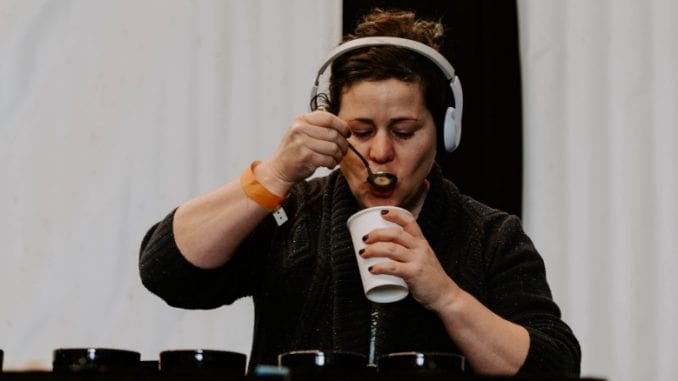
Coffee-roasting veteran Jen Apodaca talks to us about how she came to compete in—and win—the 2019 U.S. Cup Tasters Championship.
BY CHRIS RYAN
BARISTA MAGAZINE ONLINE
All photos by Paige Hicks
Jen Apodaca is a coffee professional with some formidable roasting-related accomplishments. She founded #ShesTheRoaster, an initiative that promotes and encourages self-identifying womxn in the coffee industry to become professional coffee roasters. She has been on the Coffee Roasters Guild’s Executive Council for four years and currently serves as its Vice Chair. And in her day job, she is the director of roasting at The Crown, Royal Coffee’s tasting room and lab in Oakland, Calif.
Though her resume is impressive, Jen had never included coffee competition participation among her achievements. However, that changed this competition season—and it changed in a big way, as Jen decided to sign up to compete in not one but two U.S. Coffee Championships events: the Cup Tasters Competition and the Roasters Competition. At the CoffeeChamps qualifier in Denver in December, Jen placed third in both events, sending her through to the U.S. CoffeeChamps in Kansas City, Mo.
On the national stage, Jen performed well in both contests, but particularly excelled in Cup Tasters. In the cupping-oriented competition, tasters receive eights sets of three cups—or triangles—where two cups are identical and one is different. The competitor who identifies the different cup the most times—and in the shortest amount of time—wins. Jen’s palate got her through to the final round, where she identified seven cups in 4 minutes and 36 seconds to become the 2019 U.S. Cup Tasters Champion.
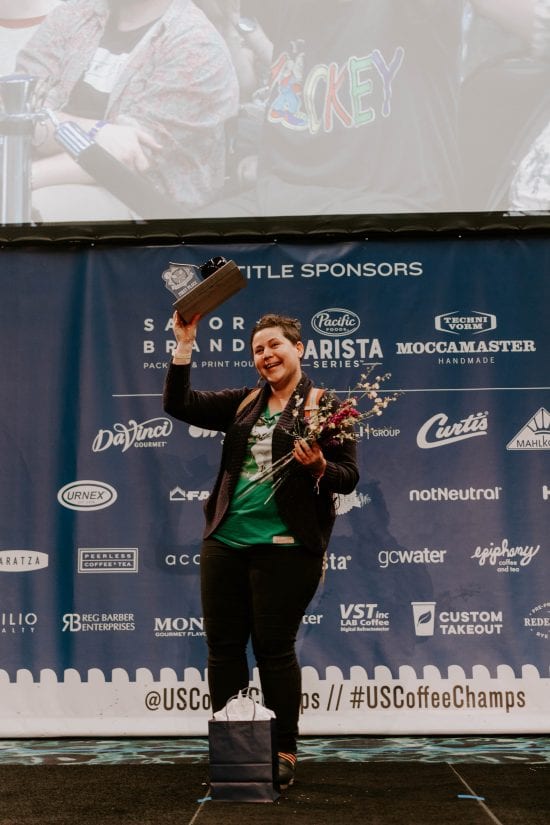
The ultra-modest Jen—who describes herself as not a particularly good cupper—will now move on to represent the United States in the World Cup Tasters Championship at June’s World of Coffee in Berlin. We talked to Jen about why she decided to compete, her experience and approach to Cup Tasters, and what it felt like to win the competition.
Chris Ryan: Why did you decide to compete in Cup Tasters this year? What was your relationship with triangulations before this competition?
Jen Apodaca: This year I decided to sign up for the Roaster Competition because I have spent several years urging women to compete, but had never competed myself. While I was on the page, I decided to give Cup Tasters a shot as well. I have never competed before, and since I was only planning to do this once, decided to get it all out in one go. I do not practice triangulations in my work, but I often cup the same coffee roasted several times on the production table, and at an importing company it is common to cup several coffees from the same farm often. I think having the experience tasting coffees from a wide selection around the world was helpful.
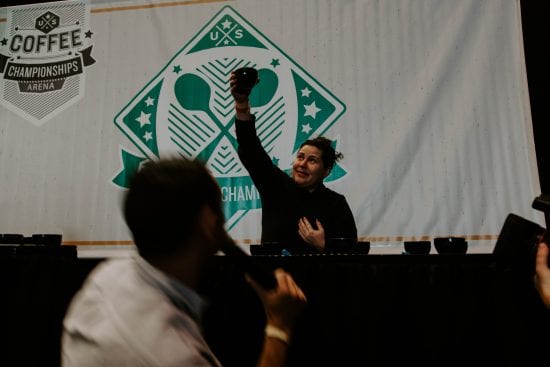
I understand you were sick for the Cup Tasters qualifiers so you had to rely on mouthfeel. I assume you weren’t sick for nationals … did you approach it differently? What did you rely on? Did you change what kinds of food you were eating leading up to it?
Yeah, I was super sick, completely congested, and I lost my voice the day before [qualifiers]. I was worried that being sick might have been the key to my success, and that maybe I wouldn’t do as well if I were healthy. Leading up to Kansas City I reduced my salt intake, but still ate spicy foods. I knew my biggest challenge was feeling at ease on the stage so I could concentrate on the coffee in front of me.
During the semifinals round they played Africa by Toto and the audience was really getting into it so they turned it up louder. I could barely hear myself think. So I did the most old-lady thing ever and yelled for them to turn the music down, which I do not regret doing. I was shocked that there was music at all since there was no music at qualifiers. For the final round I made sure to listen to music so I could drown out the House of Pain song playing over the loudspeakers.
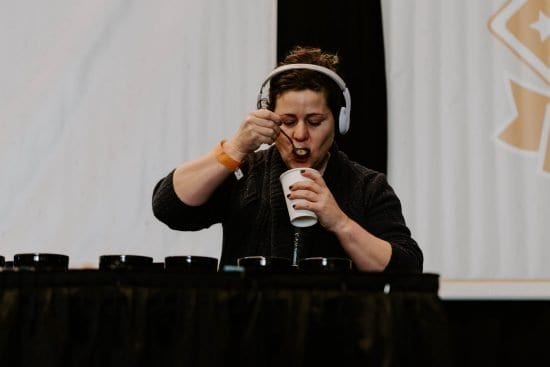
As far as your approach, did you focus more on trying to get all eight cups right, or on trying to identify them all as quickly as possible?
My original strategy was to go fast, but the coffees were proving to be difficult and the competitors that focused on accuracy instead of time seemed to be doing the best. If I couldn’t single out the odd cup after four rotations, I moved on. I only had to do this twice in the final round. Who knows what will be the best strategy on the world stage …
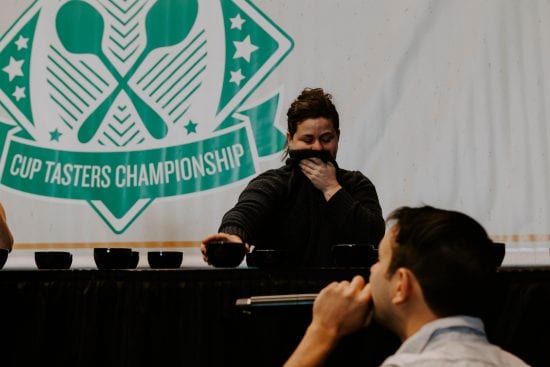
You also competed in the U.S. Roaster Championship at USCC; what was the experience like of juggling two competitions?
I think coupling any competition with Cup Tasters is easy enough to manage since there is no routine to prepare. I recommend it. The Roaster Competition was new this year for everyone. In previous years I was the chair of the Roaster Competition, and every year we changed the rules to be more in line with the world competition. Although we only had to roast the single-origin portion of the competition [this year], there were a total of five times that competitors had to check in: sample roasting, practice production roasting, green grading, scored production roasting, and serving our coffee to the audience. It was a much larger commitment than in previous years.
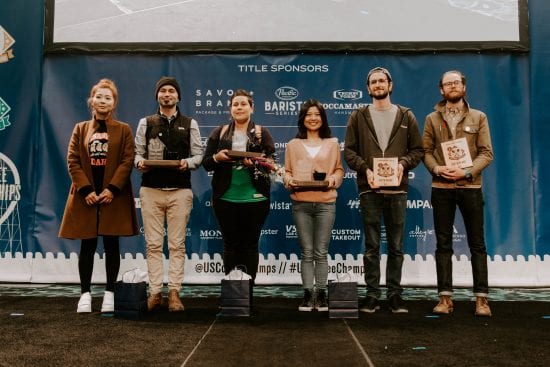
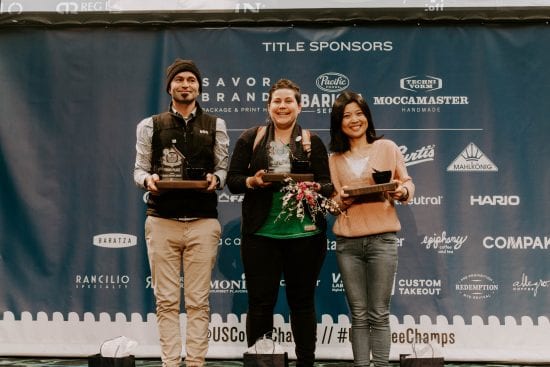
What was it like to do so well at Cup Tasters?! I assume it was unexpected, but maybe not?
I was so shocked and still am. I wanted to compete the year I was pregnant because I thought it might give me an advantage, but most coffees just tasted like heartburn and acid reflux so I decided against it. Cupping is challenging, and you have to work hard to be good at it. I have cupped with a lot of incredible professionals in my career, and I think every single one of them has taught me something. I’ve never thought of myself as a particularly good cupper. I always try to be honest about what I am tasting and not think about what I am supposed to taste or what other people might say this coffee tastes like. I think that honesty helped me advance to the finals.


